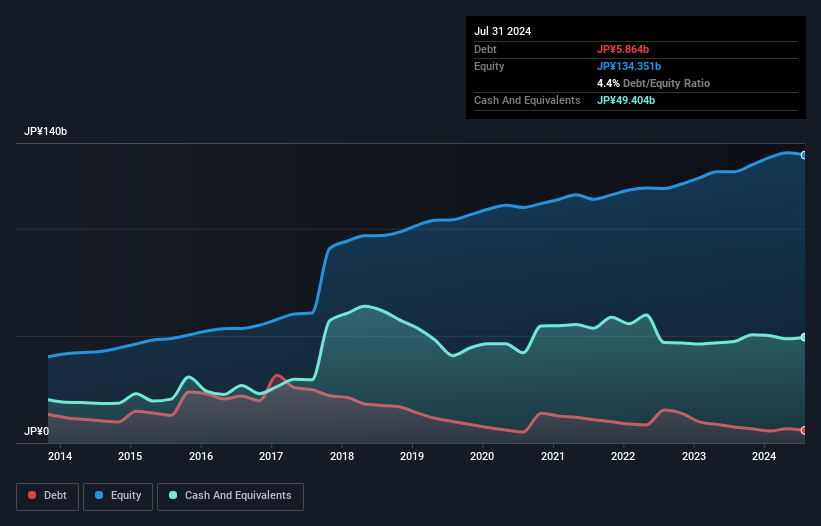Howard Marks put it nicely when he said that, rather than worrying about share price volatility, 'The possibility of permanent loss is the risk I worry about... and every practical investor I know worries about.' So it might be obvious that you need to consider debt, when you think about how risky any given stock is, because too much debt can sink a company. We can see that Ain Holdings Inc. (TSE:9627) does use debt in its business. But should shareholders be worried about its use of debt?
When Is Debt Dangerous?
Debt is a tool to help businesses grow, but if a business is incapable of paying off its lenders, then it exists at their mercy. Ultimately, if the company can't fulfill its legal obligations to repay debt, shareholders could walk away with nothing. However, a more common (but still painful) scenario is that it has to raise new equity capital at a low price, thus permanently diluting shareholders. Of course, plenty of companies use debt to fund growth, without any negative consequences. When we examine debt levels, we first consider both cash and debt levels, together.
View our latest analysis for Ain Holdings
What Is Ain Holdings's Debt?
The image below, which you can click on for greater detail, shows that Ain Holdings had debt of JP¥5.86b at the end of July 2024, a reduction from JP¥7.50b over a year. But on the other hand it also has JP¥49.4b in cash, leading to a JP¥43.5b net cash position.

A Look At Ain Holdings' Liabilities
We can see from the most recent balance sheet that Ain Holdings had liabilities of JP¥103.6b falling due within a year, and liabilities of JP¥10.2b due beyond that. Offsetting these obligations, it had cash of JP¥49.4b as well as receivables valued at JP¥27.1b due within 12 months. So its liabilities total JP¥37.3b more than the combination of its cash and short-term receivables.
Since publicly traded Ain Holdings shares are worth a total of JP¥192.6b, it seems unlikely that this level of liabilities would be a major threat. Having said that, it's clear that we should continue to monitor its balance sheet, lest it change for the worse. Despite its noteworthy liabilities, Ain Holdings boasts net cash, so it's fair to say it does not have a heavy debt load!
And we also note warmly that Ain Holdings grew its EBIT by 15% last year, making its debt load easier to handle. When analysing debt levels, the balance sheet is the obvious place to start. But it is future earnings, more than anything, that will determine Ain Holdings's ability to maintain a healthy balance sheet going forward. So if you're focused on the future you can check out this free report showing analyst profit forecasts.
Finally, a company can only pay off debt with cold hard cash, not accounting profits. While Ain Holdings has net cash on its balance sheet, it's still worth taking a look at its ability to convert earnings before interest and tax (EBIT) to free cash flow, to help us understand how quickly it is building (or eroding) that cash balance. Over the most recent three years, Ain Holdings recorded free cash flow worth 66% of its EBIT, which is around normal, given free cash flow excludes interest and tax. This free cash flow puts the company in a good position to pay down debt, when appropriate.
Summing Up
Although Ain Holdings's balance sheet isn't particularly strong, due to the total liabilities, it is clearly positive to see that it has net cash of JP¥43.5b. So we don't think Ain Holdings's use of debt is risky. Over time, share prices tend to follow earnings per share, so if you're interested in Ain Holdings, you may well want to click here to check an interactive graph of its earnings per share history.
If you're interested in investing in businesses that can grow profits without the burden of debt, then check out this free list of growing businesses that have net cash on the balance sheet.
New: Manage All Your Stock Portfolios in One Place
We've created the ultimate portfolio companion for stock investors, and it's free.
• Connect an unlimited number of Portfolios and see your total in one currency
• Be alerted to new Warning Signs or Risks via email or mobile
• Track the Fair Value of your stocks
Have feedback on this article? Concerned about the content? Get in touch with us directly. Alternatively, email editorial-team (at) simplywallst.com.
This article by Simply Wall St is general in nature. We provide commentary based on historical data and analyst forecasts only using an unbiased methodology and our articles are not intended to be financial advice. It does not constitute a recommendation to buy or sell any stock, and does not take account of your objectives, or your financial situation. We aim to bring you long-term focused analysis driven by fundamental data. Note that our analysis may not factor in the latest price-sensitive company announcements or qualitative material. Simply Wall St has no position in any stocks mentioned.
About TSE:9627
Ain Holdings
Engages in the management of pharmacies, cosmetic stores, and interior shops in Japan.
Adequate balance sheet with moderate growth potential.
Similar Companies
Market Insights
Community Narratives



